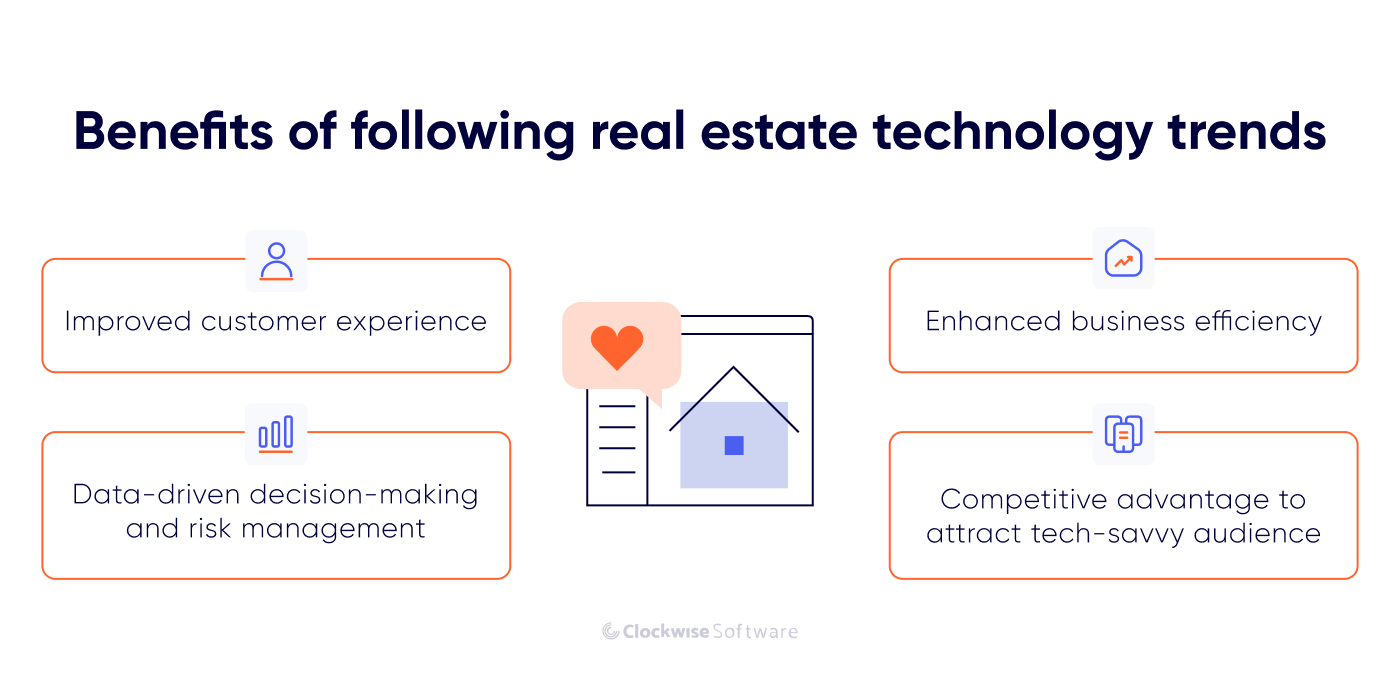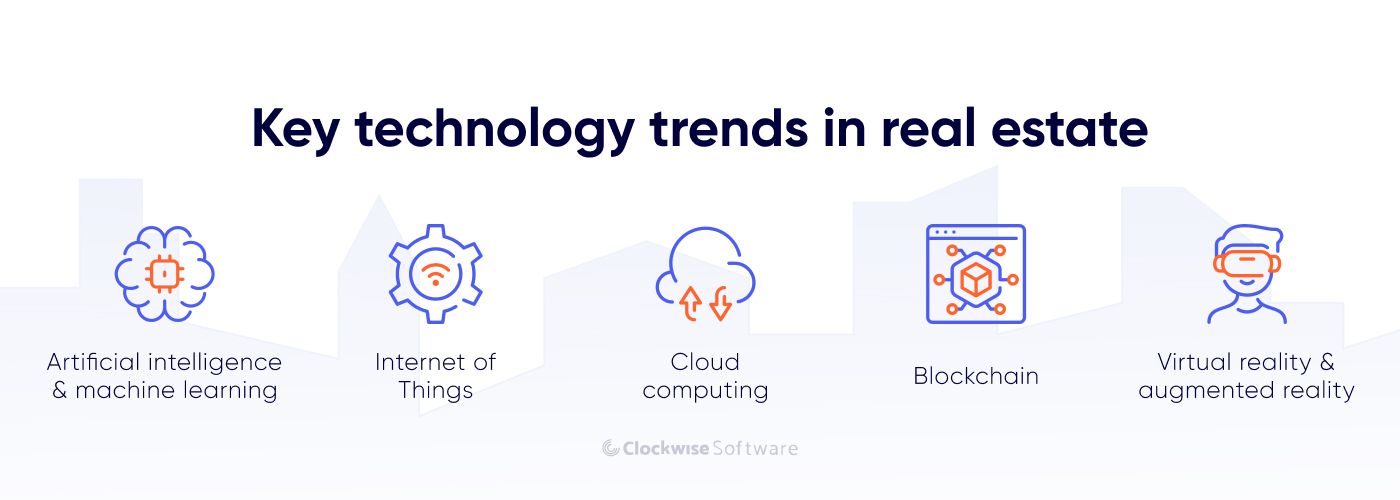AI solutions
What we do
Services
Experts in
How we work
The real estate industry has shown consistent growth for a long time and shows no sign of slowing in the near future. Proptech (property technology) is one of the main drivers behind this growth, giving real estate companies tools for enhancing efficiency and better meeting customer demands. The process of adopting new technologies across various areas of a company is called digital transformation.
But to navigate your business’s digital transformation, you need to understand real estate technology trends impacting the industry. Many real estate companies are looking for technological advancements that can enable them to improve business operations, reduce costs, and provide a better customer experience. Let’s talk about the main proptech trends that are impacting the market today and will continue to play a major role in the real estate sector in the near future.
Whether you plan to start developing a web app from scratch or update an existing application, you need to know what proptech trends are in demand and what technologies your competitors are implementing in their software. Following real estate technology market trends is not an easy task, but it’s extremely important for successful web app development. Here are the main reasons why:

Following real estate technology trends and implementing them in your software will not only make it more appealing for customers but will also enable you to make more informed business decisions and provide you with an advantage over competitors who are using apps with outdated technologies and more basic features..
It is impossible to determine one or two technology trends in real estate that will define the industry landscape in the next few years, as each technology and solution caters to specific needs and preferences. Virtual reality, the Internet of Things, the blockchain, artificial intelligence, and cloud computing are currently the most prominent trends in proptech, so let’s talk about them.
Today, it is hard to imagine an industry that hasn’t been affected by AI and machine learning. In the real estate industry, artificial intelligence is one of the driving forces behind digital transformation. AI frameworks and generative AI models make implementing artificial intelligence and machine learning technologies easier than ever, so there is no excuse for ignoring them. Let’s talk about the ways AI makes real estate apps more efficient.
Business intelligence has always been a key aspect of success in the real estate business. But technological advancements such as AI and machine learning offer new opportunities for analyzing large datasets and gaining actionable insights.
Big data analytics enable real estate agents and brokers to understand customer behavior, market trends, and investment viability better than ever. Leveraging AI-powered advanced analytics and data visualization tools allows real estate companies to enhance the user experience and retention, increase conversions by quickly analyzing customer preferences and providing personalized offerings, and seamlessly identify properties that fit custom investment criteria.
Using technologies to gain more accurate business intelligence is the perfect way to reduce the probability of human error or subjective judgment. If you are still neglecting AI technologies and rely on a more traditional approach, now is the time to get on board with this trend.
The significance of generative AI for business can’t be overstated. Advancements in large language models (LLMs) enable businesses of any size to benefit from exciting technology with seamless LLM implementation.
In real estate apps, large language models are primarily implemented in chatbots. Today, AI-powered chatbots and virtual assistants are widely used in websites, mobile apps, and messaging platforms. They allow companies to significantly enhance the user experience, handling queries 24/7 and providing timely responses. In this competitive market, immediate interactions help businesses to retain customers and lead to better conversion rates.
Virtual assistants are instrumental in streamlining property searches, automating routine administrative tasks, and analyzing data received from customer interactions. They enable real estate companies to cut labor costs, free employees’ time for tasks that require human input, and reduce the probability of human error.

Ignoring generative AI and its benefits today is difficult, but if you are still not leveraging this technology, there is no better time to start. (For more on this, read our article on generative AI meaning for business leaders.) You can integrate a third-party LLM, train an open-source model using your own data, or build a private large language model in-house.
Cloud computing services have revolutionized the way many industries operate and are now among the most prominent web technology trends. Real estate companies have been able to achieve new levels of efficiency using cloud-based solutions. Whether you choose off-the-shelf software or build a custom cloud solution, it will be a real game-changer for your business. Not needing to host and maintain hardware and infrastructure, being able to seamlessly integrate cloud-based tools into existing systems, and having unmatched scalability are the main advantages of this technology. Here is how you can benefit from cloud-based software.
Advancements in cloud computing have enabled real estate companies of any size to benefit from property management systems. Before cloud service providers became widely available, building custom property management software required significant resources. Cloud-based systems are much more cost-efficient and require no on-premises infrastructure. These software solutions can benefit real estate professionals in numerous ways, and technological advancements only make property management systems more powerful.
For businesses looking to build tailored solutions, investing in a property management software development service ensures a system that meets specific operational needs and integrates seamlessly with existing tools.
Property management software has been helping industry professionals to streamline business operations, enhance communication with clients, and automate routine tasks for a long time. But cloud-based property management systems offer instant information updates, better data gathering and analytics, and easy collaboration. Also, cloud-based software is more scalable and can easily be integrated with other systems. There are software solutions for any type of real estate, from residential and commercial to industrial and special purposes, such as sports arenas and healthcare facilities.
Property management systems are evolving rapidly, and an increasing number of property management companies are implementing emerging solutions such as the blockchain for secure transactions or AI-powered chatbots and analytics tools. These technologies will definitely make property management software even more efficient, so if you still don’t use such software, now is the time to start.
Customer relationship management (CRM) systems are hardly a novelty, but the widespread adoption of cloud computing and AI implementation has made them more accessible and efficient than ever. Today, it is hard to imagine a successful real estate company operating without CRM software.
Modern CRM systems support third-party integrations and allow real estate professionals to easily access relevant information on marketing activities and customer interactions within one platform. AI integration can significantly enhance data analysis and help to automate routine marketing tasks, such as writing real estate listing descriptions or answering client queries.
In a competitive market, real estate companies need to seize every opportunity to make their marketing more efficient. Building a custom CRM or choosing a suitable off-the-shelf solution can help your business gain a competitive advantage and provide your customers with a superior experience.
One of the most prominent proptech trends is the widespread implementation of Internet of Things (IoT) smart devices. Once a novelty, today, Internet of Things devices are everywhere. According to the Global Real Estate Technology Survey 2023 by JLL, 48% of real estate companies consider IoT as the next technology to adopt. In the near future, we can expect to see smart sensors and devices in the majority of new buildings and expect to see older properties retrofitted to provide the same level of comfort and connectivity. IoT will remain crucial not only for residential properties, but also becomes one of the top technology trends in commercial real estate. It is crucial to learn about IoT-powered devices and software that will impact the industry in the future. Let’s take a look at several use cases.
Internet of Things devices gained popularity as a way to make our lives more convenient, but with a growing emphasis on sustainability and energy efficiency, these devices have become even more essential. Today, many households use IoT sensors. Electricity use, water consumption, room temperature, security systems, smart locks, and more can be controlled with a smartphone or even voice command.
Another area that Internet of Things integrations have revolutionized is property security. Tenants and homeowners can monitor various smart sensors in real time, control locks remotely, and receive alerts about water and gas leaks. Also, IoT devices can send instant notifications about any issues and even automatically schedule maintenance.
One of the most prominent among the latest real estate technology trends is building management systems (BMS). This type of real estate software allows real estate companies and property managers to remotely monitor and control a building’s physical environment in real time using IoT sensors. A BMS can control room temperature, humidity, lighting, air conditioning systems, the flow of people through specific areas, and more.
Building management systems are set to play an increasingly important role in the real estate landscape due to a growing emphasis on sustainability and greentech. A BMS can keep the temperature within set parameters or turn off lights automatically according to the level of natural light, time of day, or room occupancy. These software solutions also allow property managers to quickly identify emergencies or maintenance needs. Installing a BMS can turn an ordinary building into a smart one.
In the European Union, building management systems in new buildings will become mandatory by 2025, and the United Kingdom recommends installing them in buildings with high energy consumption. In no time, BMSs will become part of our everyday lives and one of the biggest residential and commercial real estate technology trends. Maybe now is the right time to develop a BMS software solution?
Today, advancements in 3D digital modeling and widespread implementation of Internet of Things devices allow real estate professionals to create digital twins — virtual replicas of buildings that faithfully mirror and stay synchronized with actual buildings using data from smart sensors.
Digital twins can be extremely useful during any stage of the property lifecycle. Construction companies can use digital twins to create detailed digital replicas of future buildings or even entire neighborhoods. This will help them to better envision structural aspects and accurately predict energy consumption, environmental impact, and efficient space utilization. But digital twins are useful not only during construction. Homeowners and property managers can use them for optimizing energy consumption and reducing the carbon footprint, managing inventory, planning safer floor layouts, and enabling predictive maintenance of heating and ventilation systems. Digital twins often serve as a foundation for building management systems.
Real estate developers, agents, and potential buyers can monitor data from digital twins to understand how properties can withstand certain environmental conditions, such as tornadoes or earthquakes. This enables construction companies to create safer buildings and customers to choose the most reliable option. Also, data received from digital twins can impact property insurance.
During construction, architects and developers can use digital twins to streamline processes and avoid any deviations from the initial plan. Creating virtual replicas of whole neighborhoods helps urban planners more efficiently address issues such as traffic, sustainability, and optimization of public services. For example, the city of Las Vegas recently unveiled a digital twin of one of its downtowns.
Many people still think of the blockchain as a technology used in cryptocurrencies, but it goes well beyond that. Real estate operations involve a lot of financial transactions, paperwork, and personal information exchange. A blockchain significantly increases the transparency and security of real estate transactions. Also, younger customers prefer transactions that require as few interactions as possible, and the blockchain is perfect for that.
Smart contracts are self-executing and digitally stored, with agreement terms being unalterable and written directly into code. A blockchain enables automatic execution of smart contracts once conditions are met and makes transactions transparent and irreversible. In the context of real estate deals, for instance, as soon as money lands on a seller’s account, a smart contract can grant the buyer all rights to the property they paid for.
Smart contracts can be used for basically any real estate transaction. Besides selling properties, they are the perfect option for managing leases and collecting rent. Smart contracts enable automatic rent collection with no room for disputes and can be used for ensuring that lease conditions are fully met. The decentralized nature of the blockchain makes it almost impossible to make unauthorized changes to smart contracts, and increased transparency helps to build trust among stakeholders.
The main advantage of smart contracts is how much they can simplify real estate operations. Many steps that required numerous middlemen, such as lawyers, brokers, or bankers, now can be automated. This not only saves time and increases efficiency but also helps to reduce or even eliminate fees, making operations more cost-effective. Of course, we won’t see widespread adoption of smart contracts tomorrow, but their benefits can’t be ignored, and many startups already implement them in their proptech software development solutions. To stay competitive in the real estate market, you need to become familiar with this technology.
The blockchain is also instrumental for tokenizing real-world assets, including properties. It enables assets to be divided into digital tokens, along with the selling and purchasing of fractional shares. This makes assets themselves more accessible and divisible, while blockchain technology ensures that all transactions involving tokens are secure and transparent. RWA tokenization is instrumental in democratizing the real estate market, increasing property liquidity, and allowing investors to easily adjust their portfolios and spread their risks by purchasing parts of real estate assets in different sectors.
Tokenization serves as a foundation for one of the biggest trends in real estate: fractional property ownership. Leveraging tokenization, a group of individuals can purchase various properties and share ownership. The blockchain makes this process more secure and transparent, so now even a group of complete strangers can buy a house in a popular holiday destination or a luxury neighborhood and share the rental profit.
Many real estate platforms offer opportunities for fractional property investments. Just a few years ago, the only option for this would have been a real estate investment trust, but they only accept investments starting at $25,000 — and without the transparency of smart contracts, many people are afraid to invest in fractional ownership.
Due to increased interest in fractional property investments, we have seen a rise of real estate crowdfunding platforms that allow customers to raise small amounts of capital from other users. These platforms offer real estate firms access to capital they might not otherwise raise.
There is no indication that real estate of any kind will become more accessible in the near future. Many people who want to invest in properties will turn to fractional ownership as the best option, and you must be aware of this trend in order to not lose potential buyers.
The virtual reality market has been showing consistent growth in recent years. It is still mostly used for gaming and entertainment, but it is quickly making its way into other industries as well. In real estate, VR technologies play a vital role. According to Goldman-Sachs research, almost 1.5 million real estate professionals will use VR by 2025. Do you plan to be among them? Here’s how you can add virtual reality to your daily operations:
Many real estate companies already offer virtual property tours using 3D models and VR/AR technologies, and this number will only continue to grow. Younger clients prefer virtual property viewings, at least at the first stages of the search process, as it allows them to save their time. Plus, many people today invest in properties in other countries or even on other continents, and flying to see every viewing is simply impossible. For such clients, you can offer virtual property tours and let them view multiple houses without leaving their home.
If you are still relying on photos and 360-degree videos for online property showings, you are missing a whole group of potential buyers that prefer virtual reality home tours instead of more traditional options. A virtual tour provides information about the real size of spaces and their location in the house, can show details that can’t be captured any other way, and offers potential customers an unmatched level of freedom in navigating a property.
VR and AR are also making their way into other aspects of the real estate industry. Architects and construction industry professionals are using these technologies to visualize future buildings and validate ideas early, before making significant investments. The most prominent tool for this is building information modeling (BIM).
Building information modeling is a collaborative process that enables construction professionals to plan and design buildings within one shared 3D model. BIM has been around since the 1970s and became widely used in the 2000s due to advancements in 3D modeling, but VR integrations bring it to a whole new level.
Using VR to visualize building models, construction architects, designers, and engineers can detect flaws or clashes early and solve them before they lead to delays or extra spending. Virtual meetings within the modeled space enhance collaboration and enable real-time feedback and problem-solving. Finally, clients and investors can better visualize real estate proposals using VR, which can lead to improved real estate sales due to a better understanding of the final result and a higher engagement rate.
In the near future, BIM with VR features will likely become standard practice in software development solutions for the construction industry. AR can be used for overlaying additional information over physical construction sites. According to a report by PlanRadar, in 2024, 28% of construction companies in Europe are investing in VR and AR, and in the next three years this number will reach 58%. These technologies are not going anywhere, and you should implement them in building information modeling tools to keep up.

Following technology trends is extremely important if you want to succeed in any industry, real estate included. But even if a trend or solution seems groundbreaking to you, it doesn’t mean that you need to implement it in your application. Blowing your budget because of unclear requirements is one of the biggest risks in software development.
Every technology choice you make should align with your business objectives and make your app more efficient. Some technologies, such as AI or smart contracts, can be useful for almost any solution. But more niche features can be unnecessary. Ask yourself: Does your software really need virtual tours or tokenization support right now?
If you don’t have the technical expertise necessary to decide what technologies to include in your real estate app, consider finding a product development company with expertise in your industry. An experienced IT service provider can help you with project estimation techniques to decide if it is viable to implement certain technologies. Also, consider investing in a discovery phase, as it will help you better understand your app’s core features and avoid unnecessary spending.

The real estate industry is constantly evolving, and following proptech trends is essential for your business success. In an industry as competitive as real estate, there is no doubt that your competitors are already implementing cutting-edge technologies in their software. To stay competitive, you need to offer customers the most feature-rich and efficient app you can. Keeping up with all emerging technologies can be challenging, but it will offer you significant benefits.
Whether you are building a custom proptech solution or plan to update an existing one, understanding what features you need to add to increase efficiency is the first step. Just remember that not every trending technology is the right fit for your application. To avoid unnecessary spending, consult with tech experts on your team or consider partnering with a product development company that has experience in real estate software development solutions.
